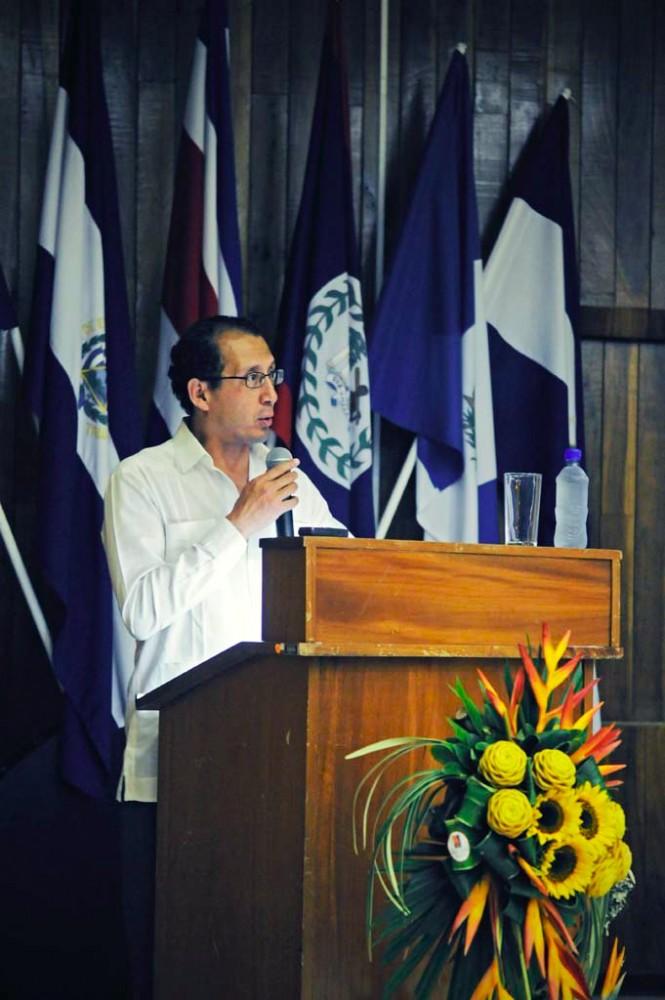Central America scholars engage at GVSU

Courtesy Photo / Dr. Dario Euraque Dr. Dario Euraque giving a presentation at the University of Costa Rica. Euraque will be speaking today at “COLLOQUIUM: Power, Justice and Public Memory in Central America” held in 2215/2216 Kirkhof Center.
Nov 3, 2011
The university welcomes two prominent historians and archivists for a day filled with presentations, discussions and refreshments today.
“Colloquium: Power, Justice, and Public Memory in Central America” brings together Dario Euraque, professor of history at Trinity College in Connecticut, and Anna Carla Ericastilla, director of the General Archive of Central America in Guatemala City, to discuss the theme of public memory.
Andrew Schlewitz, a professor of Latin American studies at Grand Valley State University, coordinated the event with financial support from the Latin American studies, political science and history departments, among others.
“[I] am good friends with Anna Carla Ericastilla,” Schlewitz said. “We’ve often talked about the issue of public memory, what it is, how it’s constructed, who gets to make it, etc.”
About a year ago, news broke about U.S.-led penicillin research in Guatemala from 1946 to 1948, where about 700 Guatemalans were infected with syphilis in order to test the efficacy of penicillin. Ericastilla has been heavily involved in researching this subject and reconstructing an account of it, Schlewitz said. He thought it would be interesting to have her speak about this example of constructing public memory.
In 2006, Euraque took leave from his position at Trinity College in Connecticut to serve as director of the Honduran Institute of Anthropology and History in Tegucigalpa, Honduras.
The IHAH is an organization responsible for publicizing the country’s cultural heritage.
Euraque recognized that although the IHAH was originally planned as a serious research endeavor, it came to produce a vision of Honduran national culture that served the tourist industry, a process he termed the “Mayanization” of Honduras.
Euraque utilized his opportunity as director to address this problem, in part, by promoting research and the designing of new museums that would present a broader variety of African and native populations of Honduras.
“I thought it would be cool to bring these two Central American practitioners of public memory to GVSU to share distinctive stories about that kind of work, examples of scholars, state bureaucrats engaged in politically volatile work” Schlewitz said.
This summer, Schlewitz returned to Guatemala to study some newly declassified documents. He approached GVSU student Heidi Fegel, a junior, about applying for the Student Summer Scholars grant so that she could accompany him.
Fegel earned the grant and helped Schlewitz conduct archival research in Guatemala City from May until mid-July. She will be presenting today.
“[I] will be talking about my experiences as a first time archivist while living in a foreign country and being a female in a society still trying to fight the machismo attitude,” Fegel said.
“Actually traveling to Guatemala and having 70-year-old documents in my hands was quite an amazing experience,” Fegel said. “It feels completely different than looking at PDFs on a computer screen. You think about who else read or held the document in your hands. It gives you the shivers.”
The one-day colloquium will be held in Kirkhof Center Room 2215/2216 from 9:30 a.m. to 5:45 p.m. Dario Euraque’s presentation will take place from 10 a.m. to 11:15 a.m. and Anna Carla Ericastilla’s presentation will take place from 1 p.m. to 2:15 p.m.
Jose Lara, Heidi Fegel and Andrew Schlewitz will present “Outside Looking In: U.S. researchers reflect on recent experiences in Central America” from 2:30 p.m. to 3:45 p.m.
Anna Carla Ericastilla and Darío Euraque will present “Inside Looking Out: Central American archivists reflect on how international researchers have used their countries’ public memories” from 4 p.m. to 5:15 p.m.
The event will conclude with an informal question-and-answer session. The event is free and open to the public.

























